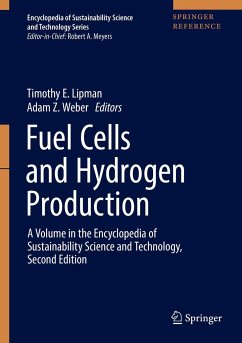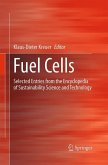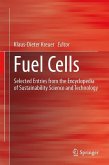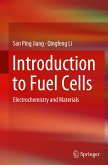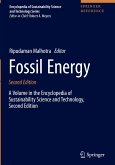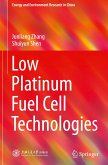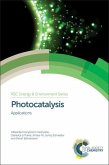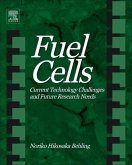Fuel Cells and Hydrogen Production
A Volume in the Encyclopedia of Sustainability Science and Technology, Second Edition
Herausgegeben:Lipman, Timothy E.; Weber, Adam Z.
Fuel Cells and Hydrogen Production
A Volume in the Encyclopedia of Sustainability Science and Technology, Second Edition
Herausgegeben:Lipman, Timothy E.; Weber, Adam Z.
- Gebundenes Buch
- Merkliste
- Auf die Merkliste
- Bewerten Bewerten
- Teilen
- Produkt teilen
- Produkterinnerung
- Produkterinnerung
The expected end of the "oil age" will lead to increasing focus and reliance on alternative energy conversion devices, among which fuel cells have the potential to play an important role. Not only can phosphoric acid and solid oxide fuel cells already efficiently convert today's fossil fuels, including methane, into electricity, but other types of fuel cells, such as polymer electrolyte membrane fuel cells, have the potential to become the cornerstones of a possible future hydrogen economy. This handbook offers concise yet comprehensive coverage of the current state of fuel cell research and…mehr
Andere Kunden interessierten sich auch für
![Fuel Cells Fuel Cells]() Fuel Cells150,99 €
Fuel Cells150,99 €![Fuel Cells Fuel Cells]() Fuel Cells150,99 €
Fuel Cells150,99 €![Introduction to Fuel Cells Introduction to Fuel Cells]() San Ping JiangIntroduction to Fuel Cells83,99 €
San Ping JiangIntroduction to Fuel Cells83,99 €![Fossil Energy Fossil Energy]() Fossil Energy335,99 €
Fossil Energy335,99 €![Low Platinum Fuel Cell Technologies Low Platinum Fuel Cell Technologies]() Junliang ZhangLow Platinum Fuel Cell Technologies75,99 €
Junliang ZhangLow Platinum Fuel Cell Technologies75,99 €![Photocatalysis Photocatalysis]() Photocatalysis248,99 €
Photocatalysis248,99 €![Fuel Cells Fuel Cells]() Noriko Hikosaka BehlingFuel Cells239,99 €
Noriko Hikosaka BehlingFuel Cells239,99 €-
-
-
The expected end of the "oil age" will lead to increasing focus and reliance on alternative energy conversion devices, among which fuel cells have the potential to play an important role. Not only can phosphoric acid and solid oxide fuel cells already efficiently convert today's fossil fuels, including methane, into electricity, but other types of fuel cells, such as polymer electrolyte membrane fuel cells, have the potential to become the cornerstones of a possible future hydrogen economy.
This handbook offers concise yet comprehensive coverage of the current state of fuel cell research and identifies key areas for future investigation. Internationally renowned specialists provide authoritative introductions to a wide variety of fuel cell types and hydrogen production technologies, and discuss materials and components for these systems. Sustainability and marketing considerations are also covered, including comparisons of fuel cells with alternative technologies.
Hinweis: Dieser Artikel kann nur an eine deutsche Lieferadresse ausgeliefert werden.
This handbook offers concise yet comprehensive coverage of the current state of fuel cell research and identifies key areas for future investigation. Internationally renowned specialists provide authoritative introductions to a wide variety of fuel cell types and hydrogen production technologies, and discuss materials and components for these systems. Sustainability and marketing considerations are also covered, including comparisons of fuel cells with alternative technologies.
Hinweis: Dieser Artikel kann nur an eine deutsche Lieferadresse ausgeliefert werden.
Produktdetails
- Produktdetails
- Encyclopedia of Sustainability Science and Technology Series
- Verlag: Springer / Springer New York / Springer, Berlin
- Artikelnr. des Verlages: 978-1-4939-7788-8
- 2019 edition
- Seitenzahl: 1179
- Erscheinungstermin: 25. Oktober 2018
- Englisch
- Abmessung: 271mm x 195mm x 79mm
- ISBN-13: 9781493977888
- ISBN-10: 1493977881
- Artikelnr.: 50591069
- Herstellerkennzeichnung
- Libri GmbH
- Europaallee 1
- 36244 Bad Hersfeld
- gpsr@libri.de
- Encyclopedia of Sustainability Science and Technology Series
- Verlag: Springer / Springer New York / Springer, Berlin
- Artikelnr. des Verlages: 978-1-4939-7788-8
- 2019 edition
- Seitenzahl: 1179
- Erscheinungstermin: 25. Oktober 2018
- Englisch
- Abmessung: 271mm x 195mm x 79mm
- ISBN-13: 9781493977888
- ISBN-10: 1493977881
- Artikelnr.: 50591069
- Herstellerkennzeichnung
- Libri GmbH
- Europaallee 1
- 36244 Bad Hersfeld
- gpsr@libri.de
Timothy E. Lipman is an energy and environmental technology, economics, and policy researcher and lecturer with the University of California - Berkeley. He is serving as Co-Director for the campus' Transportation Sustainability Research Center (TSRC), based at the Institute of Transportation Studies, and also as Director of the Northern California Center for Alternative Transportation Fuels and Advanced Vehicle Technologies (NorthCAT -- see "northcat.org") effort. Tim's research focuses on electric-drive vehicles, fuel cell technology, combined heat and power systems, biofuels, renewable energy, and electricity and hydrogen energy systems infrastructure. Lipman received his Ph.D. degree in Environmental Policy Analysis with the Graduate Group in Ecology at UC Davis (1999). He also has received an M.S. degree in the technology track of the Graduate Group in Transportation Technology and Policy, also at UC Davis (1998), and a B.A. from Stanford University(1990). His Ph.D. dissertation titled "Zero-Emission Vehicle Scenario Cost Analysis Using A Fuzzy Set-Based Framework" received the University of California Transportation Center's 'Charlie Wootan' Ph.D. dissertation award for 1999. He is also a 2005 Climate Change Fellow with the Woods Institute at Stanford University, and he also received a 2004 Institute of Transportation Engineers service award, a 1998 NSF IGERT teaching fellowship, a 1997 University of California Transportation Center Dissertation Grant, a 1996 ENO Foundation Fellowship, a 1995 University of California Transportation Center Dissertation Grant, and a 1994 Chevron Foundation Fellowship. A native of Golden, Colorado, he graduated Cum Laude from Colorado Academy in 1986. Most of his research projects are related to the transformation of energy systems to support motor vehicles and buildings, examining how both incremental and "leap frog" technologies can be applied to reduce greenhouse gas emissions and other negative environmental and social impacts of energy use. A central concept for his research is that the electrification of the transportation sector can realize synergy with a concentrated effort to reduce the carbon intensity of the electrical grid, yielding benefit for the electricity sector as well as the expanded use of electricity, hydrogen, and biofuels. Adam Z. Weber holds B.S. and M.S. degrees from Tufts University, the latter under the guidance of Professor Maria Flytzani-Stephanopoulos. Next, he earned his Ph.D. at University of California, Berkeley, in Chemical Engineering under the guidance of John Newman. His dissertation work focused on the fundamental investigation and mathematical modeling of water management in polymer-electrolyte fuel cells. Dr. Weber continued his study of water and thermal management in polymer-electrolyte fuel cells at Lawrence Berkeley National Laboratory, where he is now a staff scientist and program manager for Hydrogen and Fuel Cell Technologies. His current research involves understanding and optimizing fuel-cell performance and lifetime including component and ionomer structure/function studies using advanced modeling and diagnostics, understanding flow batteries for grid-scale energy storage, and analysis of solar-fuel generators where he is a Thrust coordinator at the Joint Center for Artificial Photosynthesis (JCAP). Dr. Weber has coauthored over 110 peer-reviewed articles and 10 book chapters on fuel cells, flow batteries, and related electrochemical devices; developed many widely used models for fuel cells and their components; and has been invited to present his work at various international and national meetings. He is the recipient of a number of awards including a Fulbright scholarship to Australia, the 2008 Oronzio and Niccolò De Nora Foundation Prize on Applied Electrochemistry of the International Society of Electrochemistry, the 2012 Supramaniam Srinivasan Young Investigator Award of the Energy Technology Division of the Electrochemical Society, a 2012 Presidential Early Career Award for Scientists and Engineers (PECASE), the 2014 CharlesW. Tobias Young Investigator Award of the Electrochemical Society, a Kavli Fellow in 2014, and the 2016 Sir William Grove Award from the International Association for Hydrogen Energy. He is a Fellow of The Electrochemical Society.
Part 1: Fuel Cells.- Alkaline Membrane Fuel Cells.- Direct Hydrocarbon Solid Oxide Fuel Cells.- Fuel Cell Comparison to Alternate Technologies.- Fuel Cell Types and Their Electrochemistry.- Fuel Cells (SOFC): Alternative Approaches (Electroytes, Electrodes, Fuels).- Fuel Cells, Introduction.- Membrane Electrolytes, from Perfluorosulfonic Acid (PFSA) to Hydrocarbon Ionomers.- Molten Carbonate Fuel Cells.- PEM Fuel Cell Materials: Costs, Performance and Durability.- PEM Fuel Cells and Platinum-Based Electrocatalysts.- PEM Fuel Cells, Materials and Design Development Challenges.- Phosphoric Acid Fuel Cells for Stationary Applications.- Polybenzimidazole Fuel Cell Technology.- Polymer Electrolyte (PE) Fuel Cell Systems.- Polymer Electrolyte Membrane (PEM) Fuel Cells, Automotive Applications.- Polymer Electrolyte Membrane Fuel Cells (PEM-FC) and Non-noble Metal Catalysts for Oxygen Reduction.- Proton Exchange Membrane Fuel Cells: High-Temperature, Low-Humidity Operation.- Solid Oxide Fuel Cell Materials: Durability, Reliability and Cost.- Solid Oxide Fuel Cells.- Solid Oxide Fuel Cells, Marketing Issues.- Solid Oxide Fuel Cells, Sustainability Aspects.- Part 2: Hydrogen Production Science and Technology.- Advances on Inorganic Membrane Reactors for Production of Hydrogen.- Biohydrogen Production.- Biohydrogen Production from Agricultural Residues.- Electrochemical Hydrogen Production.- Genetic Optimization of Microalgae for Hydrogen Production.- Hydrogen Production from Biological Sources.- Hydrogen Production from High-Temperature Fuel Cells.- Hydrogen Production Science and Technology.- Hydrogen Production through Pyrolysis.- Hydrogen via Direct Solar Production.- Hydrogen Production through Electrolysis.- Photo-catalytic Hydrogen Production.
Part 1: Fuel Cells.- Alkaline Membrane Fuel Cells.- Direct Hydrocarbon Solid Oxide Fuel Cells.- Fuel Cell Comparison to Alternate Technologies.- Fuel Cell Types and Their Electrochemistry.- Fuel Cells (SOFC): Alternative Approaches (Electroytes, Electrodes, Fuels).- Fuel Cells, Introduction.- Membrane Electrolytes, from Perfluorosulfonic Acid (PFSA) to Hydrocarbon Ionomers.- Molten Carbonate Fuel Cells.- PEM Fuel Cell Materials: Costs, Performance and Durability.- PEM Fuel Cells and Platinum-Based Electrocatalysts.- PEM Fuel Cells, Materials and Design Development Challenges.- Phosphoric Acid Fuel Cells for Stationary Applications.- Polybenzimidazole Fuel Cell Technology.- Polymer Electrolyte (PE) Fuel Cell Systems.- Polymer Electrolyte Membrane (PEM) Fuel Cells, Automotive Applications.- Polymer Electrolyte Membrane Fuel Cells (PEM-FC) and Non-noble Metal Catalysts for Oxygen Reduction.- Proton Exchange Membrane Fuel Cells: High-Temperature, Low-Humidity Operation.- Solid Oxide Fuel Cell Materials: Durability, Reliability and Cost.- Solid Oxide Fuel Cells.- Solid Oxide Fuel Cells, Marketing Issues.- Solid Oxide Fuel Cells, Sustainability Aspects.- Part 2: Hydrogen Production Science and Technology.- Advances on Inorganic Membrane Reactors for Production of Hydrogen.- Biohydrogen Production.- Biohydrogen Production from Agricultural Residues.- Electrochemical Hydrogen Production.- Genetic Optimization of Microalgae for Hydrogen Production.- Hydrogen Production from Biological Sources.- Hydrogen Production from High-Temperature Fuel Cells.- Hydrogen Production Science and Technology.- Hydrogen Production through Pyrolysis.- Hydrogen via Direct Solar Production.- Hydrogen Production through Electrolysis.- Photo-catalytic Hydrogen Production.

